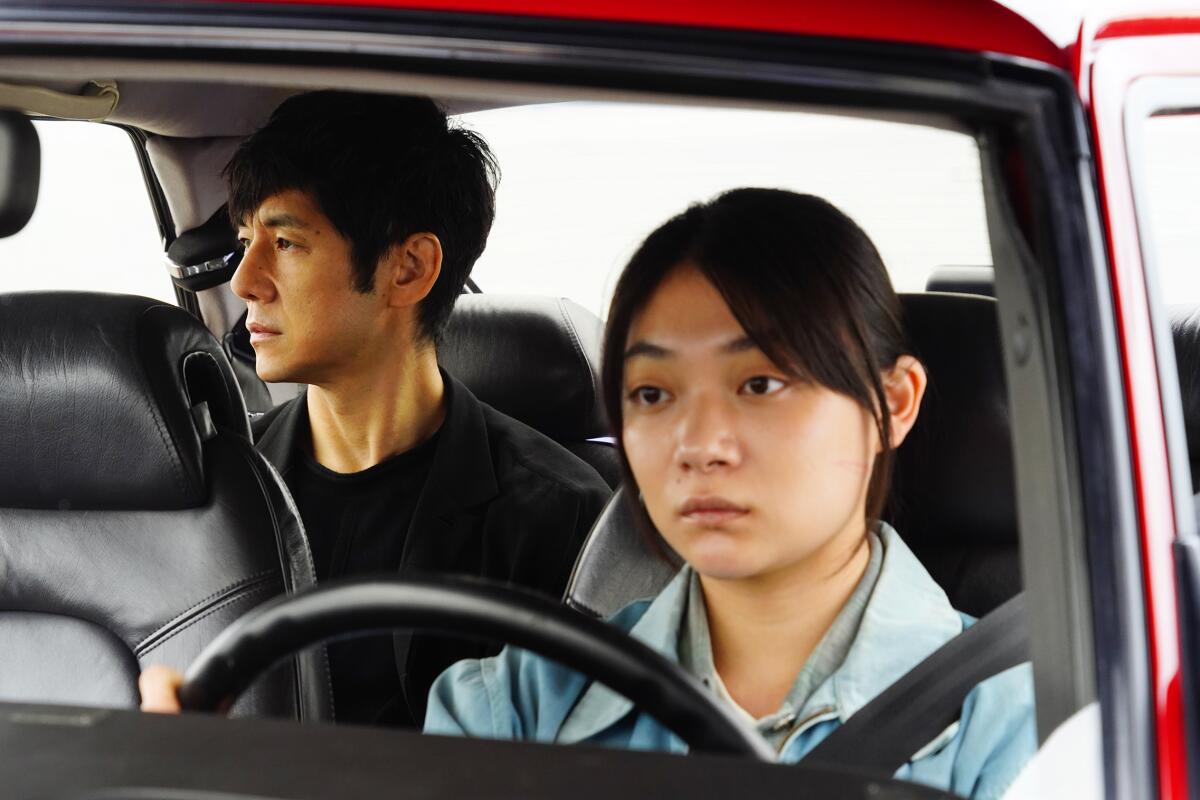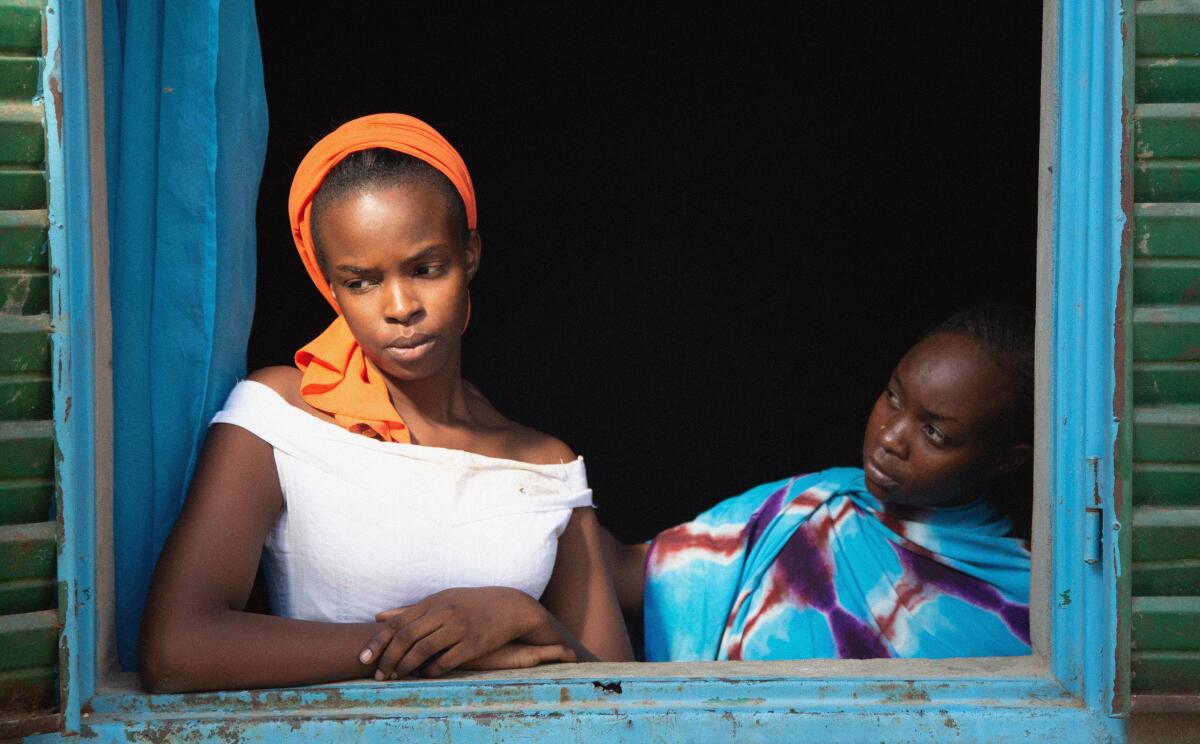Some of the year’s best movies are about to screen at AFI Fest. Here are 11 picks

- Share via
It’s been a resurgent year for film festivals around the world. After sitting out last year due to the COVID-19 pandemic, Cannes and Telluride both came roaring back with masked attendees and robust lineups. Venice, one of the few major festivals to pull off a successful in-person event in 2020, fared even better this year. New York and Toronto, which went mostly virtual last fall, welcomed back crowds and eased their restrictions. All of this is very good news for AFI Fest, which will rebound from its all-online edition last year with a mix of in-person and virtual screenings, and which will feature a number of strong titles drawn from several of those earlier events.
There are some excitingly unknown quantities in the lineup, too, including the opening-night selection: “Tick, Tick … Boom!” is an Andrew Garfield-starring adaptation of the semi-autobiographical stage musical by the late Jonathan Larson. Kicking off the festivities Wednesday night at TCL Chinese Theatre, the Netflix release marks the studio feature directing debut of the one and only (and extremely busy) Lin-Manuel Miranda.
That said, world premieres and red-carpet galas have seldom been AFI Fest’s big selling point. What makes this annual event such a vital destination for Los Angeles movie lovers is its unflagging commitment to screening some of the finest movies that have played all over the world and its trust in an audience as adventurous as its selectors (led by Sarah Harris, the director of programming).
I’ve only seen a fraction of the lineup myself and am looking forward to catching up with more. But here, listed in alphabetical order, are 11 of my own personal must-see highlights:
“Ahed’s Knee”
In a season of movie directors turning the camera on loosely fictionalized versions of themselves (Joanna Hogg’s “The Souvenir Part II,” Mia Hansen-Løve’s “Bergman Island”), no one has done so in more witheringly self-critical fashion than the Israeli filmmaker Nadav Lapid (“Synonyms”). Here he follows his cocky, leather-jacketed alter ego (Avshalom Pollak) to a remote desert village, where long walks give way to fierce arguments, and denunciations about art and censorship, justice and injustice arise. Lapid doesn’t go easy on himself, but he reserves his fiercest condemnation for an Israeli government that he calls out again and again in this raw, excoriating howl of a movie.
“Drive My Car”
Running three hours with nary a dull moment, Ryûsuke Hamaguchi’s masterly adaptation of a Haruki Murakami short story follows a grieving actor and director (Hidetoshi Nishijima, in one of the year’s great performances) as he quietly undertakes a new multilingual production of “Uncle Vanya.” A fascinating emotional and psychological triangle develops; the Chekhovian blurs exquisitely into the Murakamian; and the power of art is both confronted and affirmed by a filmmaker working at the crystalline peak of his powers.

“Lingui, the Sacred Bonds”
In the months since it premiered at Cannes, this latest beautifully acted and filmed drama from the Chadian director Mahamat-Saleh Haroun (“A Screaming Man”) has only become more dispiritingly relevant. Centering on a woman (Achouackh Abakar Souleymane) who seeks an abortion for her 15-year-old daughter (Rihane Khalil Alio), this swift, suspenseful drama becomes a blistering attack on patriarchy — and a warm reaffirmation of “the sacred bonds” that bind all women suffering underneath it.
“Memoria”
Neon courted applause and controversy with its recent announcement that this Colombia-set wonderment from the Thai master Apichatpong Weerasethakul would be shown exclusively on the big screen as part of a never-ending city-to-city theatrical tour that begins Dec. 26 in New York. It’s worth nabbing an early seat at AFI Fest, where you can fall into this deeply mysterious, ultimately transfixing journey through sound, perception, history and, yes, memory, in which the great Tilda Swinton proves the most intrepid of guides.
“Parallel Mothers”
The recent “Pain and Glory” rightly earned Pedro Almodóvar some of his best notices in recent memory. He deserves still more for this glorious melodrama, which achieves that rare balance of exuberant life and exquisite control typical of his best work. As visually and emotionally vibrant as you’d expect, the movie swirls around subjects and motifs that are classically Almodóvarian (motherhood, womanhood) and some that are not (the grim history of the Spanish Civil War), all of it anchored by Penélope Cruz in one of her most effortlessly great performances.

“Petite Maman”
Céline Sciamma’s short, bittersweet follow-up to “Portrait of a Lady on Fire” would make a lovely double bill with “Parallel Mothers” and also a fascinating study in contrasts. It’s the quietest of conjuring tricks, muted and wintry in its colors and slow to reveal its secrets, but its tale of a mother-daughter adventure like no other arrives at a similar wellspring of deep, delicate emotion.
“Pleasure”
I watched Ninja Thyberg’s blistering debut feature via the virtual Sundance Film Festival and had to imagine the impact it might have had in packed Park City venues, with its unsparingly confrontational portrait of a young Swedish woman (an excellent Sofia Kappel) trying to make it in a U.S. porn industry that thrives on degrading extremes. Presenting her protagonist as neither a barn-storming heroine nor a disempowered victim, Thyberg has instead made an appreciably tough, serious-minded look at a business where sexual violence is commodified rather than concealed.
“The Power of the Dog”
The lives of four characters living in 1920s Montana ranch territory are pulled into a taut, knotty web of secrets and lies in Jane Campion’s elegantly unnerving adaptation of Thomas Savage’s 1967 novel. A western set in the key of a psychological chamber piece, with all kinds of unnerving rhythms and dissonances along the way, it’s also a marvelous showcase for the talents of Kirsten Dunst, Kodi Smit-McPhee, Jesse Plemons and, above all, Benedict Cumberbatch, giving what may be his scariest — and saddest — performance.

“Procession”
Six men recount their childhood sexual abuse by Catholic priests in this latest conceptually bold, intensely collaborative work from the nonfiction filmmaker Robert Greene (“Bisbee ’17,” “Kate Plays Christine”). But they don’t just share their stories; they write, direct and even appear in filmed reenactments of them, asserting power and authority over memories they’ve spent most of their lives trying to suppress. The result is a work of rare, raw-nerved insight into group therapy and individual trauma, as well as a moving vision of male friendship and strength in the face of evil.
“Red Rocket”
Simon Rex delivers the performance of his extremely wide-ranging career, playing a washed-up porn star who returns to his old Texas stomping ground — pointedly, on the eve of the 2016 U.S. election — in this raucous and righteously depressing American-hustle odyssey. The latest from Sean Baker, one of the great humanist farceurs working in independent movies (“Tangerine,” “The Florida Project”), it would play as an intriguing companion piece to “Pleasure,” funnier but in its own way no less appalling.
“The Worst Person in the World”
A welcome return to form for the gifted Norwegian filmmaker Joachim Trier (“Reprise,” “Oslo, August 31st”) that also announces the birth of a star in Renate Reinsve, deserving winner of the best actress award at Cannes this year. As a young woman careening between men, career paths and other life decisions big and small, Reinsve gives this exceedingly nimble romantic dramedy its restless energy, its quicksilver shifts in tone and its unexpectedly piercing emotional depths.
AFI Fest 2021
Where: TCL Chinese Theatre and Chinese 6 Theatres
When: Wednesday through Nov. 14
Tickets: $17 for regular screenings ($10 for virtual; $25 for red-carpet premieres); $150 for passes
More info: fest.afi.com
More to Read
Only good movies
Get the Indie Focus newsletter, Mark Olsen's weekly guide to the world of cinema.
You may occasionally receive promotional content from the Los Angeles Times.











